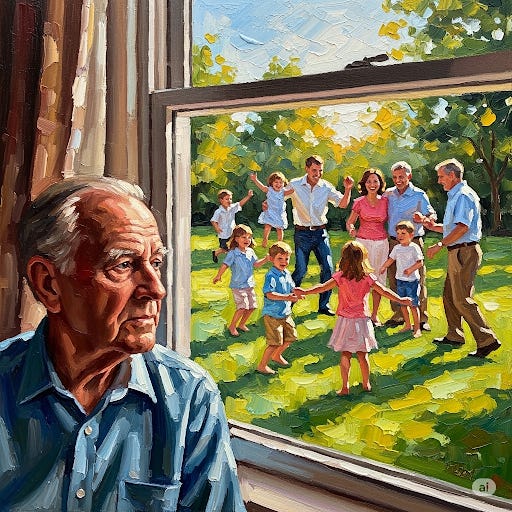Solvency Crisis
Social Security. 850 words, 2 minute read. With ChatGPT.
Howard Fletcher knew two things for sure: the scrambled eggs weren’t eggs, and he wasn’t about to thank Margaret Blevins for having kids.
“They’re not even trying anymore,” he muttered, prodding the gelatinous yellow mound on his tray with a plastic fork. “Tastes like someone printed ‘egg’ and fed it to a Roomba.”
Margaret, across the table, didn’t look up from her knitting. “You complain every Tuesday.”
“It’s Thursday,” Lorraine said flatly. She was frowning at the nutritional info projected onto her placemat. “Which means we get ninety-five dollars this week. And a video message from the Secretary again. Her hologram blinked at me last time.”
“Progress,” Margaret said, looping another row of yarn. “Back in our day, they just mailed you silence.”
George chuckled. “Still better than that year they paid in postage stamps.”
Howard leaned back, chair creaking beneath him. The cafeteria, like everything else at Palmetto Vista Rejuvenations, was aggressively cheerful. Wall screens looped endless views of Swiss hillsides. Someone had piped in simulated birdsong again.
“It’s obscene,” Lorraine muttered. “This whole ‘conditional benefits’ thing. We paid in just like you two. Forty years of taxes. And because we didn’t pop out dependents, we get shuffled off to the Gray Wing with the rest of the childless undesirables.”
Margaret’s needles paused, mid-loop. “You didn’t invest in the system,” she said, not unkindly. “Social Security was never just about money. It’s about people. That was always the math.”
Howard gave a short laugh. “Funny how that only became ‘the math’ after all the people with kids got power.”
George shrugged. “They had to keep it solvent. You need a next generation to pay into it. No workers, no benefits.”
Lorraine snorted. “We didn’t want to raise children in a collapsing biosphere. That was our civic duty.”
Margaret smiled without teeth. “And yet here we are. Still collapsing. But now with birthday parties and art projects on the weekends.”
They fell into silence for a while, broken only by the artificial sparrows and the faint whir of Margaret’s knitting.
In their shared room, Lorraine peeled off her orthopedic slippers and sat down slowly on the bed. The mattress hissed as it adjusted to her weight.
“We did what we were supposed to,” she said. “Lived responsibly. Recycled. Donated. No carbon offsets, just less carbon. We were the future.”
Howard shuffled to the window, palms pressed to the glass. Outside, two drones trimmed the garden hedges into perfect geometric spirals. A third one hovered, scanning for emotional distress. He closed the curtain.
“You think we should’ve done it?” he asked. “Had a kid? One of those last-minute ones, like people do with rescue dogs.”
She gave a dry laugh. “We could’ve named her Afterthought.”
He turned. “But maybe… we’d be in the Green Wing. They get walnut furniture, Lorraine. Real towels.”
She rubbed her forehead. “You remember that vacation in Lisbon? Rooftop bar, orange wine, laughing so hard I nearly choked on olives?”
He nodded, lips twitching.
“We couldn’t have done that with a toddler.”
“No,” he agreed. “But toddlers grow up.”
She didn’t answer. The silence between them wasn’t bitter, just heavy, like the silence in an empty house after guests have left.
They were back in the conservatory when the noise started—bright voices and the squeal of sneakers on polished floor tiles.
George and Margaret’s children had arrived.
Anna, Jacob, and Theo breezed in with their genetic upgrades and light jackets that adjusted to mood. Behind them, two grandchildren darted into the room, brandishing handheld AI foxes that made unsettling chirps.
“Hi Mom!” Anna hugged Margaret hard. “Sorry we’re late. Sammy had a meltdown in the parking drone.”
George stood, his arms already open. “There’s my tornadoes.”
The kids barreled into him, one climbing onto his lap, the other asking why the sky smelled like soup today.
Lorraine watched it all in silence. Margaret was glowing, the kind of glow you couldn’t manufacture. Not even with full-spectrum daylight bulbs and mood-balancing meal plans.
Howard leaned close, voice low.
“That used to be us,” he said.
Lorraine didn’t take her eyes off the scene. “No,” she said. “We were never that loud.”
One of the children giggled, a sharp, rising sound that cracked through the room like real air.
Lorraine stood. “I’m going for a walk.”
Howard didn’t follow. He stayed there, watching the boy draw circles on George’s knee with a finger, like he was tracing time backwards.
Curious how much is AI? Read the prompts here.


